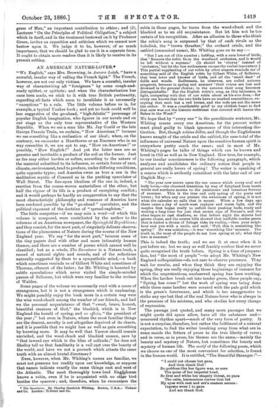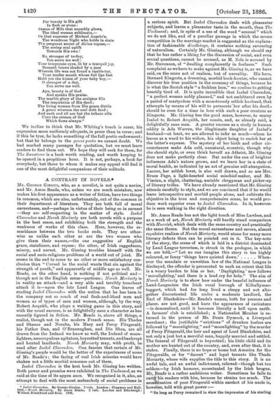AN AMERICAN NATURE-LOVER. , "WE English," says Mrs. Browning, in Aurora
Leigh, "have a scornful, insular way of calling the French light" The French, however, are not our only victims. We have a scornful, insular way of characterising all " foreigners " by some rough-and- ready epithet, or epithets ; and when the characterisation has once been made, we stick to it with true British pertinacity, regarding all facts which seem to invalidate it as necessarily " exceptions " to a .rnle. The little volume before us is, for example, a typical Yankee book ; and yet no book could well be less suggestive of the go-ahead, " high-faluthe " personage of popular English imagination, who figures in our novels and on our stage as the only true representative of the Western Republic. When we see a man like Mr. Jay Gould or the late George Francis Train, we exclaim, " How American !" because we see something like a realisation of our ideal ; when, on the contrary, we encounter a Hawthorne or an Emerson who in no way resembles it, we are apt to say, " How un-American !" or possibly, " How English !"- And yet the latter men are as genuine and inevitable a product of the soil as the former. Just as fire may either harden or soften, according to the nature of the material submitted to its influence, so certain forces of race, climate, environment, tend to produce, under differing conditions, quite opposite types ; and America owns as true a son in the meditative mystic of Concord as in the pushing speculator of Wall Street. The fine-spun idealism of the one is, indeed, a reaction from the coarse-woven materialism of the other, but half the vigour of its life is a product of energising conflict ; and it would perhaps be hardly an exaggeration to say that the most characteristic philosophy and romance of America have been rendered possible by the "go-ahead" speculator, and the political exponent of the doctrine of " spread-eagleism."
The little essayettes—if we may coin a word—of which this volume is composed, were contributed by the author to the columns of an American newspaper, the Springfield Republican; and they consist, for the most part, of singularly delicate observa- tions of the phenomena of Nature during the course of the New England year. We say "for the most part," because some of the tiny papers deal with other and more intimately human themes,and there are a number of poems which cannot well be classified ; but as a whole, The Saunterer is a Nature-book, a record of natural sights and sounds, and of the reflections naturally suggested by them to a sympathetic mind,—a book which sometimes reminds us of Gilbert White and sometimes of Thoreau, oftenest of the latter ; for Mr. Whiting is haunted by subtle speculations which never visited the simple-minded parson of Selborne, but which were very familiar to the recluse of Walden.
Some pages of the volume we necessarily read with a sense of strangeness, but it is not a strangeness which is nnpleasing. We might possibly enjoy the book more in a certain way were the wise wood-chuck among the number of our friends, and had we the personal acquaintance of that " sweet, brave, honest, beautiful creature of God," the bluebird, which is in New England the herald of spring, and ex officio," the president of the year ;" but even in Nature, where the most familiar things are the dearest, novelty is not altogether deprived of its charm, and it is possible that we might lose as well as gain something by knowing more. It may be well that Yarrow should remain unvisited, and the wood-chuck and bluebird unseen, save by "that inward eye which is the bliss of solitude ;" for does not Shelley tell us that familiarity is a veil cast over the beauty of the world, and have we not a proverb which attests the same truth with an almost brutal directness ?
Even, however, when Mr. Whiting's names are familiar, we must not presume too readily upon our knowledge, or suppose that names indicate exactly the same things east and west of the Atlantic. The most thoroughly town bred Engliiihmate knows a robin, even if he is acquainted with no ot4er bird besides the sparrow ; and, therefore, when he encounters the • The Saunterer. By Charles Goodrich Whiting, Besten,,U.S.A.: Ticknor. sad Co. London: Trabner and W.
robin in those pages, he turns from the wood-chuck and the bluebird as to an old acquaintance. But let him not be too certain of his recognition. After an allusion to those who think the robin's song is surpassed by that of such rivals as the bobolink, the " brown thrasher;" the orchard oriole, and the catbird (unmusical name), Mr. Whiting goes on to say :—
" But I am not of this number ; holding, with a rare lover of birds, that' Remove the robin from the woodland orchestra, and it would be left without a soprano.' (It should be 'chorus' instead of orchestra,' but let the fine enthusiasm excuse the verbal inaccuracy.) This partial supplanting of our robin by other singers reminds me of something said of the English robin by Gilbert White, of Selborne, that best lover and knower of birds, and all the 'small deer' of fields and woods. Redbreaats, . he observes, are called autumn eongsters, because in spring and summer their voices are boat and drowned in the general chorus; in the autumn their song becomes distinguishable.' But the English robin's song, as this intimates, is light, comparing with that of our robin about as hie size does,—for every one knows that the two birds have no marked resemblance, ex- cepting that each has a red breast, and the reds are not the same tint either. It was a considerable grief to my ohildiah heart to find that ours was not the historio redbreast that covered with leaves the Babes in the Wood."
We hope that by " every one " in the penultimate sentence, Mr. Whiting means every one American, for the present writer must plead guilty to blank ignorance of this interesting dis- tinction. But, though robins differ, and though the Englishman knows naught of the oriole and the catbird, the sum-total of the influences of universal Nature upon the sensitive human spirit is everywhere pretty much the same ; and in most of Mr. Whiting's pages he talks of things which can be known and loved in Old as well as in New England. How true, for example, to our insular consciousness is the following paragraph, which analyses and annihilates the ordinary notion that people in general are really lovers of spring ! The writer is speaking of a season which is evidently coincident with the later end of our English May :—
" The year now enters upon the one season which every soul and body loves,—the charmed transition by way of fairyland from harsh winds and northern storms to the passionate and luxurious fervour of summer. This is the tree and only spring of the poets and lovers ; for when any one praises the sweetness of spring, it is not what the calendar so.calls that is meant. When a few days ago there came a day of south-west zephyrs and warm light, and the maples first began really to unfold their pushing bads, ready and waiting a long time for just that secret sign of Nature's, and the elms began to cast shadows, so that before night the streets had grown closer, and the nearer hills showed that ineffable tender green that is rather a dream of foliage than its reality,—then your neigh- bour met you with a smile, and said, Well, this is something like spring I' He was mistaken,—it was 'something like' summer. The truth is, the most of the people do not love spring at all ; what they love is summer."
This is indeed the truth ; and we see it at once when it is put before us ; but we may as well frankly confess that we never quite recognised the truth before. Spring is a time of prepara- tion, but " the most of people "—to adopt Mr. Whiting's New England colloquialism—do not care to observe processes. They wait for results, and when they think they are enjoying the spring, they are really enjoying those beginnings of summer for which the unpretentious, unobserved spring has been working. When the larches break out into tender green, these people say, " Spring has come !" but the work of spring was being done while these same larches were covered with the pale gold which is the green's forerunner, and which is too unaggressive to strike any eye but that of the real Nature-lover who is always in the presence of his mistress, and who studies her every change of expression.
The passage just quoted, and many more passages that we might quote did space allow, have all the substance and— measured rhythm apart—much of the very form of poetry. It is not a surprise, therefore, but rather the fulfilment of a natural expectation, to find the writer breaking away from what are in some moods the fetters of prose to the true liberty of verse; and in verse, as in prose, his themes are the same,—mainly the beauty and mystery of Nature, but sometimes the beauty and mystery of human life. The motif of the following poem, which we choose as one of the most convenient for selection, is found in the human world. It is entitled, "The Beautiful Stranger :"—
" I could not choose but gaze,
And then thank God !
So goddess-like her figure was, so sure The poise of her imperial head, So firm and white her shapely throat, so pure The calm, harmonious curves that fed
My eyes with rest and art's content secure :
Ingrate were I to gaze And not thank God. For beauty is His gift In flesh or stone : Statue of Milo that superbly glows,
The ideal woman sublimate,—
Or that supreme of Michael Angelo's, The wondrous Night who holds in state
TI e pregnant secret of divine repose,—
The seeing soul uplift Towards His own !
So, stranger of to-day, You serve me well : Your temperate eyes, lit by a tranquil joy, Beneath brows shaded by a past Wherein life was not found a bauble toy, Your tender mouth whose full lips fast Hold yet the kisses of your baby boy,- 0 stranger of a day, You serve me well.
Aye, beauty is of God And speaks His praise.
The marble glory of the sculptor fills The inspiration of His deed ; The living woman from His grace distils A grace whereon the soul doth feed ; And each and all are but the tribute rills Unto the stream of God Which flows always."
We incline to think that Mr. Whiting's touch is surer, his expression more uniformly adequate, in prose than in verse ; and if this be true, he lacks something of the full poetic endowment; but that his belongs to the genus poeta3 we cannot doubt We had marked many passages for quotation, but we must leave Teaders to find them out. We hope they will seek for them, for The Saunterer is a book worth reading, and worth keeping to be opened in a propitious hour. It is not, perhaps, a book for everybody, but those to whom it makes any appeal will find it one of the most delightful companions of their solitude.



































 Previous page
Previous page